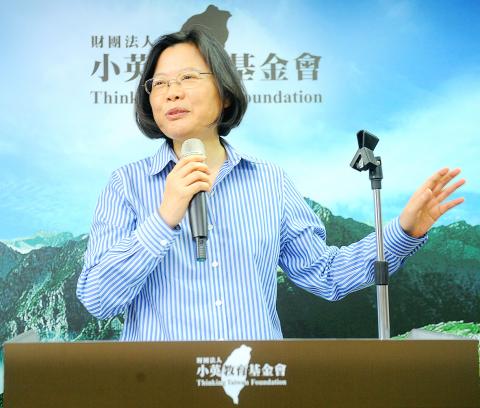Former Democratic Progressive Party (DPP) chairperson Tsai Ing-wen (蔡英文) yesterday officially announced the establishment of her foundation, the Thinking Taiwan Foundation, an organization which aims to develop charity projects and public policy.
“While it takes piles of cash to fill up a room, you can light up a room with a match. And that is what we’re trying to do,” said Tsai, who will chair the foundation, at the opening ceremony.
The foundation aimed to light three matches for Taiwan — deliberation and discussion of public policy, action to show compassion to local communities and acting as a catalyst for social action through participation, Tsai said of her first major move after losing the January presidential election.

Photo: Wang Min-wei, Taipei Times
“The ultimate goal would be to further the power of thinking, the power of action and the power of society,” said Tsai, whom many supporters expect to make another run for president in 2016.
Public policy is important because it would determine Taiwan’s future, which is bleak in many people’s eyes at present, she said.
Her foundation is determined to commit to charity works because over the years she has seen so many ordinary citizens and organizations get involved to help society move forward, she added.
The two primary goals are all about the people, she said.
“The most beautiful thing about Taiwan is its people. Without these passionate and sincere people, Taiwan would be a hollow place,” she said.
That was also why Tsai intended to make the foundation, which is funded from the NT$120 million (US$4 million) election subsidy Tsai received, free from political ideology and partisanship.
Among the board members of the foundation are former DPP secretary-general Su Jia-chyuan (蘇嘉全), Tsai’s running mate in the presidential election; former Chunghwa Telecom chairman Hochen Tan (賀陳旦); former deputy chairman of the Council for Economic Planning and Development Chang Ching-sen (張景森); journalist Antonio Chiang (江春男); and political commentator Yao Li-ming (姚立明).
Former finance minister Lin Chuan (林全) will serve as the foundation’s chief executive director.
The “Thinking Taiwan Forum” Web site, which was launched on Sunday, will play an integral part of public policy and social issues deliberation, Lin said.
The Web site will publish articles written by young professionals, academics, activists and prominent writers in six broad categories: including democracy, law, China affairs, economic affairs, society and culture.
The foundation also plans to hold open and closed-door conferences and workshops on various topics, Lin said.
According to Lin, the first closed-door conference on Taiwan’s future economic development model is scheduled to be held on Aug. 14 and Aug. 15. The conference will have panel discussions on macroeconomics, cross-strait economy, global economy, governance and a general discussion.
While the foundation will try to avoid political influence, Tsai will not shy from making political comments as a politician and a former presidential candidate, Lin said.
Tsai’s political affairs will be handled by her office, rather than the foundation, Lin said.

SHIPS, TRAINS AND AUTOMOBILES: The ministry has announced changes to varied transportation industries taking effect soon, with a number of effects for passengers Beginning next month, the post office is canceling signature upon delivery and written inquiry services for international registered small packets in accordance with the new policy of the Universal Postal Union, the Ministry of Transportation and Communications said yesterday. The new policy does not apply to packets that are to be delivered to China, the ministry said. Senders of international registered small packets would receive a NT$10 rebate on postage if the packets are sent from Jan. 1 to March 31, it added. The ministry said that three other policies are also scheduled to take effect next month. International cruise ship operators

NUMBERS IMBALANCE: More than 4 million Taiwanese have visited China this year, while only about half a million Chinese have visited here Beijing has yet to respond to Taiwan’s requests for negotiation over matters related to the recovery of cross-strait tourism, the Tourism Administration said yesterday. Taiwan’s tourism authority issued the statement after Chinese-language daily the China Times reported yesterday that the government’s policy of banning group tours to China does not stop Taiwanese from visiting the country. As of October, more than 4.2 million had traveled to China this year, exceeding last year. Beijing estimated the number of Taiwanese tourists in China could reach 4.5 million this year. By contrast, only 500,000 Chinese tourists are expected in Taiwan, the report said. The report

The Forestry and Nature Conservation Agency yesterday launched a gift box to market honey “certified by a Formosan black bear” in appreciation of a beekeeper’s amicable interaction with a honey-thieving bear. Beekeeper Chih Ming-chen (池明鎮) in January inspected his bee farm in Hualien County’s Jhuosi Township (卓溪) and found that more than 20 beehives had been destroyed and many hives were eaten, with bear droppings and paw prints near the destroyed hives, the agency said. Chih returned to the farm to move the remaining beehives away that evening when he encountered a Formosan black bear only 20m away, the agency said. The bear

Chinese embassy staffers attempted to interrupt an award ceremony of an international tea competition in France when the organizer introduced Taiwan and displayed the Republic of China flag, a Taiwanese tea farmer said in an interview published today. Hsieh Chung-lin (謝忠霖), chief executive of Juxin Tea Factory from Taichung's Lishan (梨山) area, on Dec. 2 attended the Teas of the World International Contest held at the Peruvian embassy in Paris. Hsieh was awarded a special prize for his Huagang Snow Source Tea by the nonprofit Agency for the Valorization of Agricultural Products (AVPA). During the ceremony, two Chinese embassy staffers in attendance